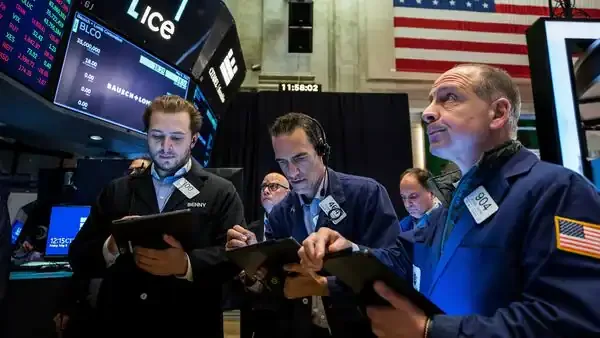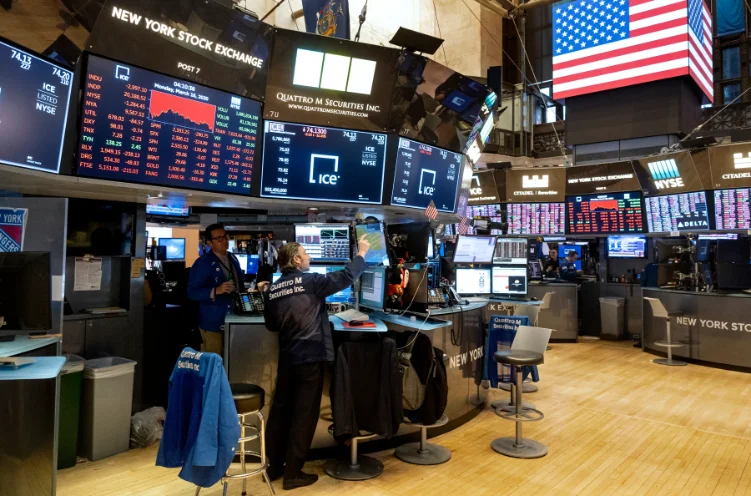Wall Street major stock indexes on Tuesday fell because long-term interest rates on U.S. government bonds continued to rise to levels not seen in many years. This happened because the latest job data turned out to be hotter than expected, which raised concerns that interest rates might stay high for an extended period.
As a result, this decline in interest rates had a negative impact on big companies like Apple, Tesla, Amazon, Alphabet, and Microsoft, causing their stock prices to drop by 0.8% to 2.5%.
Following an impressive performance in the first half of this year, largely due to the excitement around Artificial Intelligence (AI), some investors are now concerned that large-cap stocks might not maintain their momentum as long-term interest rates keep increasing.
David Russell, who is the global head of market strategy at TradeStation, commented on this situation, saying, “We’re witnessing a significant change in the 10-year Treasury yield… the yield curve had been unusual historically, and in many respects, we’re just trying to get back to normal.”
In the S&P 500, consumer discretionary stocks saw the biggest drop, falling by 2.2%. Utilities also had a decline of 1.8%.
The industrial sector experienced a slight decrease of 0.2%, but Boeing’s shares were an exception as they rose by 1.8%. This increase was due to news that United Airlines was planning to order 50 Boeing 787 Dreamliner aircraft, as reported by Reuters.
According to a Labor Department report, there were 9.61 million job openings in August, which exceeded the 8.8 million that economists had estimated in a Reuters poll.
Investors will now be paying attention to the ADP National Employment numbers and the more detailed non-farm payrolls report to get a better understanding of how the U.S. job market is doing.
Atlanta Fed President Raphael Bostic has added his voice to a growing number of Federal Reserve officials. He mentioned that because the economy is slowing down and inflation is decreasing, there’s no rush for the Fed to increase its policy interest rate. However, he also suggested that it might be a while before they consider lowering rates.
As of 10:07 a.m. ET, the Dow Jones Industrial Average was down by 228.56 points, which is about 0.68%, reaching a level of 33,204.79. The S&P 500 had decreased by 35.85 points or 0.84%, standing at 4,252.54, and the Nasdaq Composite had dropped by 134.10 points or 1.01%, to reach 13,173.67.
The S&P 500 had a stable performance on Monday. However, utility stocks, which are often seen as a substitute for bonds, experienced a significant drop due to uncertainty about the future direction of interest rates. This uncertainty arose as the 10-year Treasury yield increased following a funding deal that prevented a government shutdown.
In terms of individual companies, Airbnb’s stock fell by 4.1% after Keybanc downgraded it to “sector weight.” On the other hand, HP’s stock gained 2.2% as BofA Global Research upgraded the PC manufacturer from “underperform” to “buy” and increased its price target.
McCormick, the spice maker, saw a 9.7% drop in its stock value after it missed sales estimates for the third quarter.
Point Biopharma Global, a company specializing in cancer therapy, experienced a remarkable surge of 84.6%. This surge was due to the announcement that Eli Lilly and Co. was planning to acquire Point Biopharma Global for $1.4 billion. However, Eli Lilly’s stock decreased by 2.3% in response to this news.
On the New York Stock Exchange (NYSE), there were nearly 5 declining stocks for every 1 advancing stock, and on the Nasdaq, there were over 3 declining stocks for every 1 advancing stock.
In terms of the S&P index, there was just one stock that reached a new high for the year, but there were 48 stocks that hit new lows. Meanwhile, on the Nasdaq, there were 11 stocks that reached new yearly highs, but there were a substantial 225 stocks that reached new yearly lows.





